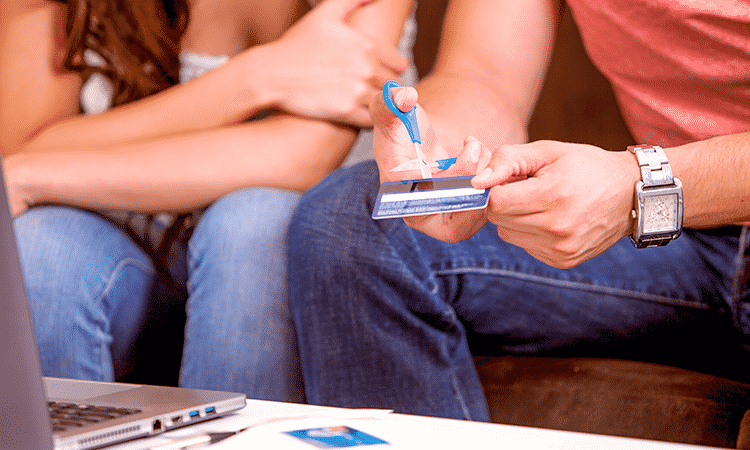
Congratulations! You finally paid off your credit card! You worked long and hard, and it has finally happened! Your credit card balance is down to zero!
You might be wondering what to do with your credit card now that it's paid off. Do you leave the card open or should you close it?
This week on Instagram, I shared with you that I finally paid off my Chase Credit Card. In my picture, I showed you the cut up credit card in little pieces lying next to a pair of scissors. Many of you asked, why did I decide to cut it up and did I close my credit card account after paying it off?
Before I talk about what I decided to do, let's talk about the pros and cons of closing a credit card after its paid off.
THE PROS OF CLOSING YOUR CREDIT CARD
I have decided to close credit cards in the past, but I did so without thoroughly thinking things through. If you were to ask me right now if you should close your credit card, my answer would be, “Probably not.”
In my opinion, there are only two real benefits to closing your credit card after you pay it off.
AVOIDING TEMPTATION
The number one reason most people choose to close their credit cards is to avoid temptation. Not being able to use your credit card forces you to avoid future debt. If you have a spending problem or are managing a heavy debt load, it might make sense to close some cards as you pay them off to minimize your temptation to spend.
MINIMIZING FEES
If your credit card is charging you fees, you should think about closing it. For example, many cards charge you an annual fee just for having the card. If you are not using it anymore, canceling the card will save you those costs each year. Some credit cards will even charge you an inactivity fee, which means you're paying the credit cards for not using it. To me, this is a waste of money!
THE CONS OF CLOSING YOUR CREDIT CARD
It's a common misconception that closing your credit card will increase your credit score. The truth is, it's more likely that closing a credit card (even one with a zero balance) will hurt your credit score rather than help it.
CREDIT UTILIZATION
Your credit utilization is the amount of your credit card balance compared to the credit limit. Your utilization essentially measures the percentage of your available credit that you're using, and it makes up about 30% of your credit score. That's a pretty huge chunk!
When it comes to your credit score, you want to keep your utilization low. If it's high, this indicates that you're probably spending a lot of your monthly income on debt payments which can put you at a higher risk of defaulting on your payments.
If you decide to close an unused card, you are reducing your available credit without decreasing your credit usage. Let's look at an example.
Let's say you have three different credit cards. You owe $1,500 on the first two which have $3,000 credit limits, and your third card has a $4,000 limit, but no balance. Right now, you are using 30% of your available credit ($3,000 in balances out of $10,000 in available credit). If you decide to close the $4,000 credit limit credit card that has a zero balance and the one you are not using, your credit utilization jumps to 50%, which has a negative impact on your credit score ($3,000 in balances out of $6,000 in available credit). Remember, you want your utilization to be low!
CREDIT HISTORY
No matter what you have heard, closing your credit card won't erase the card's history from your credit report, nor will it keep the history from being included in your credit score calculation.
Negative information remains on your credit report for at least seven years from the date it occurred. Your positive information, however, can fall off sooner than that if the card stops reporting it. If you keep the card open, that positive information (which helps your payment history and your length of credit) will stay on your credit report and helps your credit score indefinitely.
One thing you want to remember is that old credit is the best credit. The age of a credit card account is also essential when it comes to your credit score. In theory, the longer your credit history, the more accurate lenders can be in determining the level of risk they take on when lending to you.
Everyone has a unique credit history. So closing an older account can negatively impact you more than it does for someone else. As an example, if you are young and have a short credit history, closing a credit card account could hurt your overall score more than someone in their 60s who has a much longer credit history.
So what did I decide to do with my credit card? I cut it up but decided to keep the account open. My situation is a little unique because I want to buy a house in the next year or so.
Closing a credit card account can hurt you if you are attempting to get a mortgage. Before you do anything, it's important to ask yourself if you're going to be making a major financial move in the short term.
The risk of the short-term drop in your credit score is higher than the risk of just cutting up the card and forgetting about it.
For me, I decided to cut up my card (I will do so with every card I pay off), and I will hold onto the account until I'm past my home-buying hump.
Everyone situation is unique, and it's essential for you to weigh all of the pros and cons before closing your credit card account.
- Check your credit score for free at CreditKarma.com.

